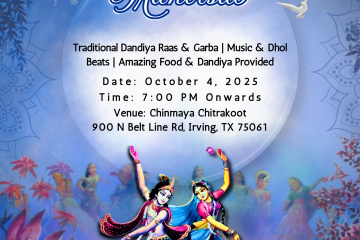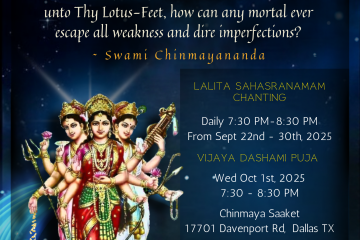Study Group Facilitators’ Training Seminar
Study Group Facilitators’ Training Seminar
After the beginnings prayers, Swamiji gave a brief history of the our Gurudev’s life till the formation of Chinmaya Mission. In the 1950s, Pujya Gurudev, Swami Chinmayananda used to conduct 41 day Gyana Yagnas. At the end of one such yagna, some devotees, whose minds were uplifted to great heights after attending the yagna, asked Gurudev as to how they can maintain their minds in those heights during Gurdev’s absence. Then Gurudev suggested that a group of like minded people should meet and study the scriptures on regular basis. Thus was born the “Study Groups” of Chinmaya Mission.
“Mere listening will not add to your beauty. These ideas are to be reflected upon deeply and digested slowly. This process is hastened only when you discuss what you have studied with others. Study Groups constitute the heart of our Mission. The ideas, when discussed with others, not only become deeply rooted in you, but as they become clearer in your own understanding, they also inspire those who listen to you. Thus, each student, while trying to strengthen his own understanding, can become an instrument for the spread of this knowledge. This process is the dynamic study scheme followed in the Vedantic tradition. This is not a Chinmaya methodology; it is the most ancient Vedantic tradition of study.”
– Swami Chinmayananda
Benefits of Study Group:
- Grow from Jalpa/Vidanda Vaada to Samvaada:
Every one of us is convinced of our intelligence and come with pre-conceived notions and ideas. This often leads to not appreciating other person’s point of view and hence pointless arguments, arrogant rejoinders called Jalpa. Another form of fruitless argument is called Vidanda, where the person makes destructive or idle criticism, just to prove the other person wrong. A regular participation in the Study Group, will lead a person from Jalpa/Vidanda to Samvada (discussion) wherein arguments are brought out with genuine desire to understand the other person’s point of view or to strengthen the groups understanding of the point of view. A little bit of Shradha (faith) on the scripture being studied will go a long way in transforming a person from Jalpa to Samvaada, a person who doubts is more prone to such arguments. Know that all the scriptures that we studying are time tested many times over many years and they work.
- Grow from anEekAgrata (Multi Pointed) to EkAgrata (Single Pointed):
Every one complains that their mind runs in thousand different places at the same time. Also we don’t have a habit of thinking continuously on a single topic. This leads the presenter going off the subject or the commentator going on a tangent in irrelevant direction. As the group facilitator will bring the discussion back to relevance, a regular participation in Study Group will develop a single pointed.
- Develop presentation skills:
Bhagavad Gita is an excellent example of how a topic should be presented. In this Lord Krishna, at the beginnings of each chapter, tells us what he is the subject of discussion in that chapter, describes the subject in details and summarizes the subject and its benefits at the end of the chapter. This is exactly how a good modern presentation is given. Hence study of the scripture and discussing it in the Study Group environment improves our presentation skills.
- Develop skills to face the life and its challenges:
Each of the scripture we study though generic are applicable to our daily life as they guide us in life to face any eventuality. However, Shradha (faith) in scripture and the guru who is commenting on the scripture is needed to get the full import of what is being said. We can always prove why the method prescribed in the scripture won’t work “in this day-n-age”. Instead have faith on the scripture, try it and then reject it if does not work.
- Develop skills of thinking in the right direction:
A 1:30 hour discourse takes approximately 30-40 hours of research and 4-5 hours of preparation of the presentation. This preparation will make the concepts crystal clear for use in your daily life.
- Develop a growth mindset:
When you read a text, you form your opinion based on your likes and dislikes and your background. However, when you participate in a Study Group and listen to analysis of the same text from 10-15 other members of the group, you get fresh look at the same text and thus our mindset grows.
Bhagavad Gita (BG), for example, is a text, that has the maximum number of commentaries than any other text. If you read commentary of it by Bala Gangadhar Tilak, you will get a full view of how BG teaches about Karma Yoga; Vinobha Bhave gives you service perspective whereas Maharishi Yogananda gives the etymological meaning of each word used in BG.
- Support Group:
Long term members of a same Study Group, after few years of study, form such a strong bond that it acts as a support group for the members of the study group. This is very important in USA as very few people have extended family nearby.
How to Conduct Study Group
- The facilitator should have a raster of all the members of group and should communicate with the group regularly; updating them of the happenings for those members who could not make it. A Yahoo group is a good of communicating with other group members.
- Start the class with 3 OMs, and sahanAvavatu.
- The two people who were assigned to discuss the chapters/shlokas will present their understanding for 5-10 minutes each. While the presentation is going on, the rest of the members jot down what did not understand or don’t agree with the argument or have a question. After both present, the floor is opened for question and further discussion.
- The facilitator summarizes the proceedings, as to what they have discussed and concluded in 3-4 sentences.
- The facilitator assigns 2 people to prepare the shlokas/chapters to be discussed in the next meeting. Note that the facilitator should always be prepared to present in case the assigned person(s) cannot make it to the next class.
- End the session with pUrNamada.
Suggestions to Study Group Facilitator
- Make sure all the members treat each other with respect.
- When someone is presenting, each member should appreciate what is good in the presentation
- Point out the wrong one with the view to enhance the understanding rather than insulting the presenter.
- Remember this benefits you the most; if others also improve in the process, then it is bonus.
- It takes time for people to evolve. Don’t expect full participation right away. It could take up to a year for the study group to blossom.
- Don’t force your opinion on others.
- Don’t expect others to improve.
Resources
List of reading material for Self Unfoldement:
- 80 Pages of Ishavasyopanishad by Swami Chinmayananda
- Vedanta the science of Life (this is out of print)
- Kindle Life
- Art of Man Making
- Meditation and Life
List of reading material for Bhagavad Gita:
- Recommended material for Self Unfoldment
- Gita for Children
- Vedanta through letters
- Every breath a teaching
- I love you letters.


